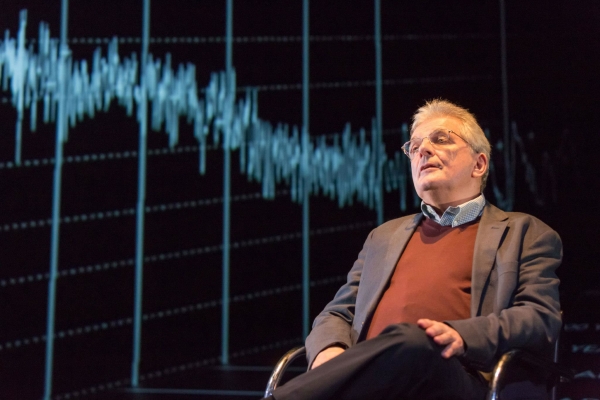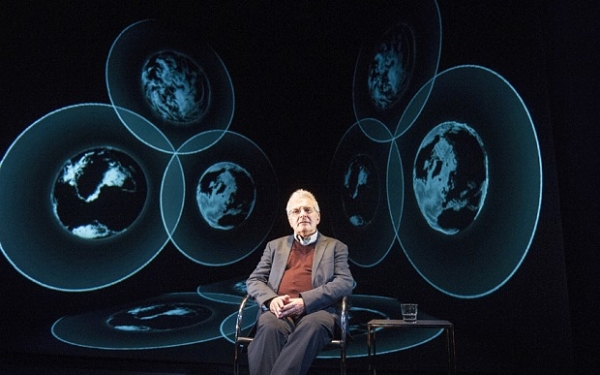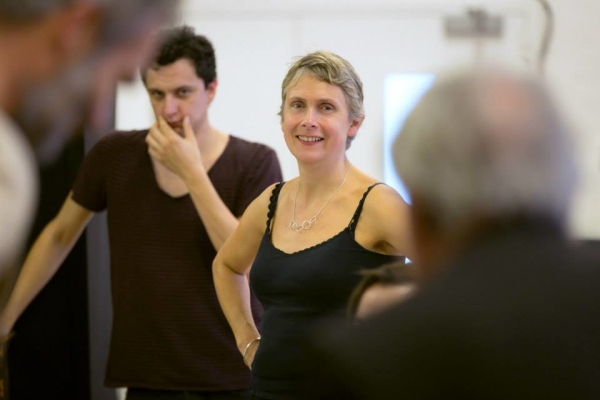Catherine Love: What do you want in a play about climate change?

© Alistair Muir
What do you want in a play about climate change? Facts, clearly presented information, some indication of what we can do to avert the worst, perhaps. But it strikes me that one vital requirement for a piece of theatre about the greatest collective threat to humankind is that it be compelling. Urgent issues should surely make for urgent theatre.
Watching 2071, the new collaboration between director Katie Mitchell, writer Duncan Macmillan and climate scientist Chris Rapley, this urgency rarely came across. Sitting in the Royal Court on Saturday afternoon, my feelings were less of urgency than of creeping boredom. The 70 minute lecture that has been mounted on the downstairs stage is informative, dense with facts and told in terms that an audience without any specialist knowledge can grasp. What it rarely manages to be, however, is gripping.
For me, this asks a central question about the relationship between theatrical form and content. Why this form? There’s no question that this is theatre – its context at the Royal Court alone ensures that. But the more pressing question, it seems to me, is why Mitchell has decided that theatre – and more specifically this kind of theatre – is the right space for discussing the dire state of our planet.
Sure, there’s plenty that’s admirable about 2071. I have huge respect for Mitchell’s commitment to staging one show a year about climate change, and spreading the facts in a clear format is an important aim. Yet I also have doubts about how much impact it will really have in this setting. As fellow critic Matt Trueman points out, the audiences who will book for 2071 are those who already care about climate change. Wouldn’t we all be better off at home with a book on the subject, or cancelling all our flights, or lobbying our local MPs? After all, those pretty (and pretty soporific) projections on stage aren’t exactly carbon neutral.
So if the likelihood is that it’s not converting all that many of its audience members, what’s the purpose of putting Rapley’s formidable knowledge on stage? Accepting that the theatre is a place where we should be talking about climate change, and accepting that most of those in the audience are already concerned, a more useful approach might be to get us thinking about the issue and what we can do about it in different ways, from different perspectives.
Which brings me back to that pairing of form and content. As far as I could tell, the whole setup of 2071 was intended to make the experience as untheatrical as possible. Rapley has the least emotive approach possible to what (as he even tells us) is an incredibly emotive topic, while the entire show is determinedly static. To an extent, I can understand the logic; going too far the other way would be dangerous, threatening to swallow up bleak facts in a swelling tide of feeling. But to completely remove emotion from the equation only seems to cut away one of the factors likely to move us to action.
Mitchell herself has put form to ingenious use in illuminating similar content in the past. Her production of Macmillan’s play Lungs for the Schaubuhne Theatre in Berlin sounds like a fascinating example: putting the performers on static bikes powering the lights, the staging both points to climate issues by taking the production entirely off the grid and builds in automatic urgency through the frantic pedalling of the actors.
In a different way, The Planet and Stuff at the Polka Theatre last year utilised elements of interactive theatre to explain climate change to kids and make them feel empowered to do something about it. Even just an acknowledgement of the fact that theatre requires us to all be in a room together – not an irrelevant observation considering that climate change is a challenge that faces all of us, as a collective group of people – might have made 2071 more powerful. Because what’s the point of putting something on stage if you’re not going to use the tools at theatre’s disposal?












